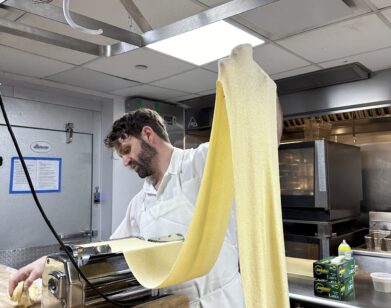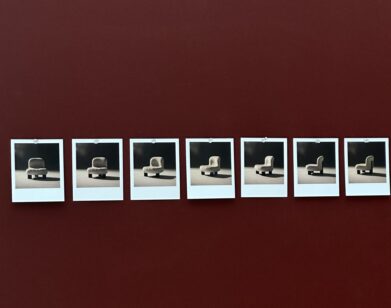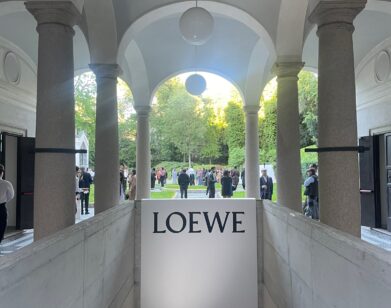Being There

ABOVE: GEOFF DYER. PHOTO COURTESY OF CHRIS STEELE-PERKINS
Don’t meet your heroes, ever. Unless, of course, your hero is Geoff Dyer—but then don’t meet him either, or else you will have the false impression that the rest of your heroes are gracious, soul-crushingly smart, and regularly, frequently, laugh-out-loud funny. After talking with and listening to Dyer for a half hour or so, the rest of your heroes might sound like the music in a gym.
Dyer is, of course, the National Book Critics Circle Award winner (for his 2011 essay collection Otherwise Known as the Human Condition), celebrated as much for his merry disregard for genre as he is for his hilarious and acute observations—on art, on Burning Man (Yoga for People Who Can’t Be Bothered to Do It), on jazz (But Beautiful), and on D.H. Lawrence (Out of Sheer Rage). But if his canon is famously difficult to consolidate onto a single shelf, each of his books has achieved its quantum of (growing) fame for the crackle of Dyer’s singular, I-was-there-and-this-is-what-happened brand of storytelling. In his newest, Another Great Day at Sea (out today from Pantheon), the 55-year-old Englishman goes “in residence” aboard a U.S. aircraft carrier, and, well, fish-out-of-water hilarity ensues.
A somewhat famously fanatical devotee of Donut Plant donuts, Dyer recently had a stroke (and wrote, but beautifully, about the experience), which compelled him to kick the sugar habit. Knowing this, and then promptly forgetting it, I brought him a few of his favorite sweets. As I was dithering through a mortified apology, Dyer gamely teased me about bringing “a poisoned chalice,” and promptly forgave me. Don’t meet your heroes bearing killer bear claws.
CHRIS WALLACE: Well, now that we’re on the topic of the stroke… I’m curious if there was a point during the experience when you put on your observer’s hat and thought, “Oh shit, I have to write about this.” Or, “Wow, this is going to be good material.”
GEOFF DYER: I would see it slightly differently. I wasn’t very far into the experience before I sensed a revenue opportunity. [both laugh] No, I think it was quite early on, because it was such an extraordinary thing to happen. It would’ve been mad to let it go. Also, it fell into a nice little narrative arc. And, although it was a stroke, and what they kept saying was, “Any stroke is inherently incredibly serious,” the truth was, in the larger scheme of the stroke, it was minor. I got off incredibly lightly. It was a real warning shot about this cholesterol. So the only aftermath of it for me is this Lipitor that I’m taking—I play a lot of tennis, so I’m used to getting pulled muscles and stuff, which clear up after three or four days. But I had a calf strain that lasted about four weeks, then played again then got a groin strain, so I’m convinced that it’s inhibiting the recovery for this stuff.
WALLACE: In your Paris Review interview, you mention the burden of noticing-ness. You compare yourself in this respect with the great noticer Updike. Adam Begley, who just wrote the Updike biography, had a great line in a recent interview that the only time that Updike ever turned off his noticingness was “volleyball, Sunday sports, and maybe fucking.”
DYER: [laughs] The latter maybe not. I like how he said “maybe.”
WALLACE: Indeed. He goes on to allow that Updike was definitely an observer in his own carnal experiences. But I wonder if there is ever a time where you do turn it off.
DYER: Oh my god. I mean the problem for me is more turning it on than turning it off.
WALLACE: [laughs] I doubt that.
DYER: It’s just extraordinary the extent to which I go through the world obliviously. I wasn’t entirely joking in that Paris Review interview about the noticing stuff. And I guess during that stroke phase—there’s a lot of detail in the piece, but that’s because it was so, you now, suddenly life was super-charged again. But no, really, I don’t notice stuff.
WALLACE: See, I think it’s about scale. In Another Great Day at Sea, you talk about not being a reporter in the traditional sense of going out and getting verifiable facts from sources. But I think that you are a reporter of your own, interior experience. That never turns off.
DYER: Oh yeah, that I can turn on. It would be nice to turn off that incessant churning of consciousness.
WALLACE: Do you think that’s Only Child Syndrome?
DYER: I can’t remember whether you’re an only child.
WALLACE: I am.
DYER: What do you think?
WALLACE: Isn’t it only-child-syndrome-y to ask a question so utterly self-reflexive that you then ask about me?
DYER: [laughs] You’re good at this, aren’t you? I guess it is a lonely child thing because—yeah—you’ve got nobody else to consult with.
WALLACE: Surely that’s why I became a writer, to fill in the blank spaces. And you—an only child—as you’ve said, write your way toward an understanding, or up to a point of some knowledge. Is there ever a point where you’ve crossed that threshold, but the piece you’ve written to get there is not yet complete? You quench your thirst, but then feel like, “Oh, I have to mount a whole new charge here because I owe it to the piece.”
DYER: I’m tempted to say, no, I don’t think there is. But then, I reckon it might turn out that there was some more donkeywork that I should’ve put in. I’m struggling to think of an example where it has happened, where I really needed to go at it again. I think I can recognize when a piece is at a state of completion. I always say to my wife, “Oh yeah, it’s roughly finished.” I’ve got it there. And then there’s that whole other phase of moving on to properly amp up the sentences and sometimes to move stuff around as well. But essentially, it would be over when I… I’m struggling with this because it’s such a good question about the whole way one does these things.
WALLACE: It’s something I think about a lot—or used to anyway. Now, I don’t know. Now I feel like I do homework for a living.
DYER: Well, there’s the great Martin Amis line: “All those years of homework.”
WALLACE: Exactly. And, speaking of homework, you have that great bit in “Reader’s Block,” about the diminishing capacity for a work of art to impact our lives—just by the sheer volume of our experience, reading even War and Peace at 40 can only add so much to our wisdom pile. I wonder if you are ever still, if less profoundly now, awed by anything, in the way you were by Lawrence, Tarkovsky, Camus, Berger, and the rest? Or, to ask it another way: are there any recent, or recently discovered, books or movies you wish you had gotten to in that ripe time of youth when a book or a movie could change your life?
DYER: Depressingly, my first response to this is, “Nope, not had that intensity of experience for quite a while.” But, fortunately I realize that in the last year or two I’ve fallen for Annie Dillard with all the former ardor—phew! And there are lots of works of non-fiction that have had a big impact—but not a formative impact in the way that Berger did. La Grande Bellezza last year was a pretty overwhelming cinematic experience. And my deepening love of straight, classical music, especially Bach, feels momentous. But, more generally, I certainly stand by the claim I made about that magical period in one’s early 20s.
WALLACE: The first time I read Another Great Day at Sea, I think I was waiting for an irony shoe to drop—or for some satire or criticism or lampooning of the military that never comes. It’s enthusiastic where I expected exasperation, gung-ho where normally you are droll.
DYER: I’ve never been much drawn towards satire of any kind. I don’t like that style whereby you kind of stitch people up. But the deeper thing is that I just find these people so impressive and admirable. Okay, there was an ideological disagreement, and a religious one—well even on the religious side, it was interesting to me because I hadn’t encountered it en masse like that. So, it wasn’t that I had to restrain myself. I always hope to come up with a style of writing that’s appropriate to the material and I felt like this was. And then there’s plenty of—I don’t know if it’s the right word but—lampooning, but it’s always at my expense. [laughs]
WALLACE: You do cast yourself in contrast—the old fuddy duddy to these young, vibrant kids. In that way the book feel like it’s about aging, losing elasticity, losing flexibility. As compared to the Lawrence book, say, where you are youthfully impatient, this feels almost earnest, or adult, or something.
DYER: I would hope that nothing that I write would ever seem earnest [Wallace laughs] because I subscribe absolutely to Nietzsche’s claim when he says, “Ah, earnestness, the sure sign of a slow mind.” Earnest people are always a bit on the thick side in my experience. But, I would agree with you on the aging thing. Because, at a certain point, once you start noticing it, it is your subject. And I know young that people, when they get to 30, say, “Oh, I’m so old.” But actually, around 50, you do become conscious of it. And in my case, soon after I was 50, both my parents died, which this book talks about. It’s this thing that’s going on all the time—aging. Paul Auster quotes the poet [George Opren] on growing old: “What a strange thing to happen to a little boy.” Which I think is so profound.
WALLACE: There are so many things in Another Great Day that are very you. There’s the sort of fish out of water—you’ve put yourself in this exotic scenario and you’re reporting back from your internal experiences there, which you’ve done time and again… I mean, where else could you go?
DYER: I’d love to be one of the many journalists trying to get on the space junket, of course.
WALLACE: Of course. And, there is also almost a straining for ritual or for spirituality—okay, maybe not straining, but you read the sacred, and ritual, into much of what you see aboard the carrier. I feel like that’s something that you are always looking for, whether at Spiral Jetty, Burning Man, or in Thailand. Do you have your own rituals in life?
DYER: Not rituals, but I’m a person of compulsive habit. [laughs] That’s just some awful residue of a ritual. And one of the reasons for that is my living this life, which is otherwise so free of obligations. It’s not at all unusual for anybody who’s independently employed to crave a way of living whereby they create the structures without which their lives would otherwise start slopping around all over the place. But I think that’s another really smart thing you said about being drawn towards experiences and places, which offer this kind of thing. On the carrier, there were two things: One, there was the sea, which one of the people in it says it’s very conducive to these meditative states; and, two, hearing this voice [of the captain, saying prayers] over the PA at the end of every day. Little prayers. Which, of course, is all nonsense. [Wallace laughs] I kept oscillating: I’d encounter one thing, which made me quite well disposed to the sort of religious thing, and then there was another thing that was so blatantly Christian, it was obviously idiotic. I’m as hardline an atheist as anybody, but I reckon my hunger for whatever it is that might fill that place, which religion traditionally filled, is quite acute actually.
WALLACE: In Out of Sheer Rage you write about walking through the streets of London and, theoretically, looking in Julian Barnes’s window, where he is presumably toiling away. For you, at that point in your life, that’s the picture of domesticity—rigid, regimented, boring. And in this book, you took that to the nth degree. Not only did you visit a military base where all behavior is strictly circumscribed, but you locked yourself in a place from which you couldn’t escape.
DYER: For two weeks. [both laugh]
WALLACE: With a hard end date, fair. But I’m curious about the military affinity—beginning perhaps with the model airplane—things you built when you were a kid.
DYER: Well, if you look at all these books that have come out of Iraq and Afghanistan, these journalists who are embedded with these soldiers are often politically pretty liberal, and, uniformly, they come out full of admiration for these soldiers—even as these soldiers are implementing a policy which is just stupid, and dangerous. There’s always something impressive when people are giving themselves to their job absolutely. The military thing—I was conscious that their routine, their way of living is so opposite to mine. In some ways their life seemed intolerable to me. But, mine would be to them, too, because this strangely laissez-faire life of mine actually comes with its obligations as well.
WALLACE: Like what? Do you lay awake with anxieties?
DYER: Well, all sorts of things can keep one awake. But as you get older—this is what the stroke thing really brought home to me—this thing that I never paid attention to: my brain. I’ve always been conscious that, of course, after a night of getting stoned, my head would feel foggy; if I got drunk the night before I’d be hungover. But that was the extent of my concern about my brain. And then with the stroke thing, it made me realize, “God! That’s my main source of income.” So it relates actually to your other question about growing old. Because, the brain has got to be in good shape to do this. It raises this interesting question—a thing which interests me generally—about how long a writing life is going to be. I’m conscious that it both is and isn’t a job for life. There are so many variables—God. The income part of it is—it’s really important to get the income, right? [Wallace laughs] In both ways. You don’t want to get too much. Getting too much money too soon can be really bad. There’s a balance to be kept—the right balance between new experience and a certain stability in one’s life. I’m conscious of all these things in a way that, earlier on, I was only conscious of circumstantial stuff, like, money.
WALLACE: You’ve written a lot about living on the dole, getting fired—much of the subject matter for The Colour of Memory. But how did you survive, early on? Was magazine writing enough to live on?
DYER: Well, in my 20s, it was a combination of being on the dole and, even when I got off the dole, having this incredibly cheap rent-controlled flat. Which of course has been a thing that’s sustained people in New York, famously. The more time went by, the cheaper that flat became relative to the cost of the city. And, in the ’80s, the world I was living in wasn’t this world of consumption. There wasn’t that much to buy, really. Actually I’m still struck by that. There’s not an awful lot of stuff I want. Somebody quotes Diogenes, who’s walking around saying, “How many things there are in the marketplace of which Diogenes has no need.” I always feel that. Except of course when you’re living in Venice, California and you see all these lovely houses!
WALLACE: Oh yeah, I’d take a couple of those.
DYER: Yeah! [laughs]
WALLACE: How is Venice treating you?
DYER: It’s kind of great. But I’ve never really liked L.A., because of its sprawl. I spent all my time in New York last semester saying to [his wife] Rebecca, “It would be great to start our new life in Venice to get away from this relentless cultural and social overload of always going out, and going to museums.” Then of course, we get to Venice, and I find, “Oh, I really like the cultural and social overload.” There’s something about New York. You can get a nice feeling of belonging as a writer here. It’s probably the best city on Earth like that. I miss the wisecracking of New York.
WALLACE: Here I’m picturing the great stoner king of writers living in Venice, going to [the medical marijuana dispensary] The Farmacy on Abbot Kinney. But you’re not doing any drugs any more at all?
DYER: More to the point: The Farmacy is closed down.
WALLACE: That’s a travesty.
DYER: My wife’s got a medical card. We’ve got high a couple of times. I don’t know. It has not really worked for me.
WALLACE: I was imagining you, who so loathes smoke, would have a sort of resurgence because one doesn’t really need to smoke anymore.
DYER: Oh, the vaporizer. That’s great.
WALLACE: I’ve become of fan of edibles. They have, like, a Binaca spray—it’s amazing.
DYER: Like a sort of asthma thing?
WALLACE: No, like a mouthwash you spray it in your mouth and freshen your breath. You spray it three times, and you’re high. Seven and you’re blasted out of your mind. It’s wonderful.
DYER: You can control the dose?
WALLACE: That’s what I love about the edibles. You have one bagel bite, you’re good; five, and you lose your sense of reality. Speaking of, I really loved The Search; I’m so happy Graywolf are releasing that and The Colour of Memory—it’s like finding that your favorite musician has these unreleased LPs. Are you conscious of a change in attention, awareness—of your fame?
DYER: I sure am. I published so many books, which, for years, didn’t get published here in America, at all—and which barely got any attention in England. So it wasn’t going to take much to make me feel suddenly famous. So—yeah—after 20 years, I’m an overnight success.
GEOFF DYER’S ANOTHER GREAT DAY AT SEA IS OUT NOW VIA PANTHEON BOOKS.






